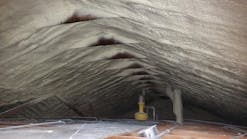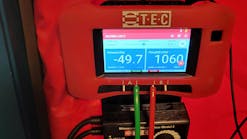by Bryce Johnson
What effect does indoor air quality (IAQ) have on our customers’ health? Today’s home and building owners have access to a lot of information, and are becoming increasingly educated about what constitutes good and bad indoor air quality. They often look to our industry for simple answers to what can be complicated questions. When they seek our advice and we respond with our opinions, suddenly we become IAQ expert consultants.
Is today’s average heating and air conditioning technician trained to identify — or for that matter even comment on — the many conditions that can impact indoor environments?
Some studies demonstrate that many people may be sick because of the homes in which they live. Other statistics claim the indoor environment can be more than 100 times dirtier than the outdoors. Imagine if these statistics are true. Are our front line industry consultants really prepared to deal with the situation? Should homeowners trust our advice regarding the health and safety of their families?
How did we become IAQ experts? Years of training? Intense accredited courses? Or is it that the equipment we install happens to include filter racks?
Many of our industry’s finest understand the challenge and have introduced products that if designed, installed, and maintained correctly will improve IAQ. But that’s a lot of ”ifs.” Unfortunately, most of these products fail to deliver the benefits promised because they are designed, installed and maintained by uneducated “IAQ Experts.” The unfortunate reality is that too many of these “experts” miss the basics. What are the basics that the “experts” are missing? Try these:
Air Flow
Any meaningful debate on air quality begins with quantifying the amount of air being circulated by the blower. If we are to have a positive impact on IAQ, we must begin with this basic understanding. How many of today’s IAQ “experts” have the tools and training necessary to perform basic airflow testing?
Filtration
Filter manufacturers have created quite a debate over the superiority of their products. How many of these manufacturers have tested their products under field conditions to understand the effect their products have in common field applications? In general, most of today’s filters are too restrictive for the applications with which they serve. They lack the necessary surface area to allow proper airflow. Additionally, many of the claims being made regarding efficiency simply don’t hold particulates when tested in the field.
Originally, filters were installed to protect HVAC systems. Unfortunately, many of us have actually participated in the widespread marketing of filters that end up installed in equipment not designed to overcome the additional resistance. This trend is particularly disturbing when both products are packaged together as a system and shipped out the equipment manufacturers’ or distributors’ doors.
VOCs
Just ask any of today’s service technicians to explain volatile organic compounds (VOCs), and you will most likely discover the depth of your service department’s knowledge regarding IAQ. VOCs, simply stated, are gases released from liquids or solids.
In today’s homes and buildings there are an increasing amount of chemicals/VOCs. The two primary ways our industry deals with VOCs are through ventilation, and the use of activated carbon. Effective use of carbon is generally an expensive method of reducing VOCs, requiring frequent maintenance or replacement. Residentially, there’s rarely enough real estate to accommodate the 45 lbs. per 1,000 cfm necessary to treat the air volume.
Ventilation is increasing in popularity in recent years, particularly in products such as heat recovery ventilators (HRVs). Once again, these products are only as good as the application installation and maintenance allows. The bottom line is too few of these systems are performing as intended when you encounter them in the field.
Of course, we’ve only scratched the service when it come to our understanding of indoor air quality. There is much to keep pace with. Mold, for example, will become a major issue in the near future as it affects our insurance policies and changes the way we think about out systems and our businesses.
How ever we became the experts, it’s time we begin to take the issues seriously — or learn to keep our opinions to ourselves.
Bryce Johnson is president of Air Conditioning by Jay, Scottsdale, AZ, and a member of Contracting Business’ Editorial Advisory Board. He can be reached at 408/922-4455, or by e-mail at [email protected].








